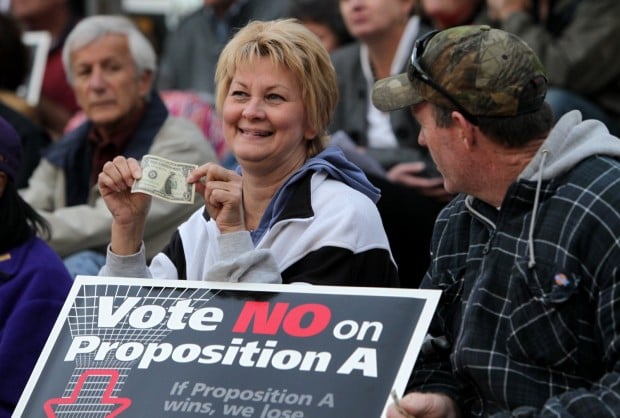ST. LOUIS ŌĆö A state appeals court on Tuesday affirmed a ruling against the cityŌĆÖs earnings tax, striking a blow that could cost ├█č┐┤½├Į millions of dollars per year and have repercussions beyond this case.
The three-judge panel ruled that the city tax collector did indeed err in refusing refunds to employees of ├█č┐┤½├Į-based companies who worked from their homes outside of the city during the pandemic. Appellate Judge Michael S. Wright, writing for the unanimous panel, said the tax collectorŌĆÖs arguments to the contrary misinterpreted the plain language of the law authorizing the cityŌĆÖs 1% earnings tax.
Bevis Schock, attorney for six nonresidents denied refunds, called the decision a win for the taxpayer.
ŌĆ£We did justice today,ŌĆØ he said during a news conference Tuesday afternoon.
The judges, however, denied the plaintiffsŌĆÖ request for class-action status to seek refunds for all earnings taxes paid by remote workers during the pandemic years, a toll once estimated to total between $75 million and $150 million.
People are also reading…
Still, city officials are bracing for the impact in the years to come. The budget for the upcoming fiscal year anticipates a loss of $26 million in earnings and payroll taxes ŌĆö about 5% of the cityŌĆÖs general fund revenue ŌĆö and prescribes sacrifices to weather the storm: flat spending after years of increases, an end to a string of 3% across-the-board raises for city workers and dozens of empty jobs going unfilled.
TuesdayŌĆÖs ruling could foreshadow the result of at least one other suit filed against the city: AT&T sued in 2022, saying the city improperly imposed the 0.5% payroll tax, paid by employers, on employees who neither lived nor worked inside city limits.
Spokespersons for Mayor Tishaura O. Jones and Collector of Revenue Gregory F.X. Daly said Tuesday afternoon officials were still reviewing the appeals court decision.
ŌĆ£Obviously, the CourtŌĆÖs conclusion that the earnings tax does not apply to remote work is contrary to the CityŌĆÖs and the CollectorŌĆÖs position,ŌĆØ said Susan Ryan, the spokesperson for the collector, in a written statement.
Rasmus Jorgensen, the spokesperson for the mayor, noted the administration had anticipated the loss and prepared a conservative budget. He said the mayorŌĆÖs office does not believe additional cuts will be necessary or that the decision will impact the current level of city services.
Aldermen were more wary, though.
Alderwoman Cara Spencer, the chair of the boardŌĆÖs budget committee and a candidate for mayor next year, said she worried about the impact to city services.
ŌĆ£This is very alarming,ŌĆØ she said. ŌĆ£WeŌĆÖve got to get serious about making city government effective and efficient.ŌĆØ
Alderman Rasheen Aldridge, who represents part of downtown and parts of the Near North Side, said he worried about losing raises for employees, a topic of particular concern when trouble with recruitment has already caused lapses in trash pickup, tree trimming and ambulance service.
ŌĆ£ItŌĆÖs very concerning,ŌĆØ he said.
The cityŌĆÖs earnings tax ŌĆö a 1% assessment on income earned by all city residents, businesses operating in the city and any nonresidents who work in the city ŌĆö has been a topic of debate for decades.
But the case at the heart of TuesdayŌĆÖs decision arose in early 2021, shortly after plaintiffs Nicholas Oar and Kos Semonski, of St. Charles County, and Mark Boles, of ├█č┐┤½├Į County, were denied earnings tax refunds for 2020.
In previous years, the city had issued rebates to Boles, Semonski, Oar and thousands of others for days they traveled and worked outside ├█č┐┤½├Į ŌĆö the collector refunded a total of $2.9 million to an estimated 4,000 people in the year before the pandemic hit.
But in 2020, when the coronavirus pandemic led many high-income, white-collar workers to trade commuting downtown for walking downstairs, things changed.
Daly, the tax collector, said the pandemic had brought about a ŌĆ£whole different set of circumstancesŌĆØ from previous years. He reasoned that workers were still working for companies based in the city, using the remote working software provided from those bases. And he started refusing refunds.
The plaintiffs sued in March 2021.
In January 2022, attorneys for DalyŌĆÖs office convinced a judge to dismiss much of the lawsuit on procedural grounds, including the class-action threat that could have added many more claims to the case.
But when city Circuit Judge Jason Sengheiser examined last year the remaining claims in the suit, he found the collectorŌĆÖs pandemic policy on remote work wanting.
The law, he said, allows for an earnings tax covering work ŌĆ£rendered inŌĆØ the city but not ŌĆ£rendered intoŌĆØ it. He ordered the city to pay back the plaintiffs, who by then numbered six.
And on Tuesday, the three-judge panel in the Missouri Court of Appeals at ├█č┐┤½├Į seconded that.
Wright, the appellate judge who wrote the opinion, said that to reverse Sengheiser would require rewriting the law.
ŌĆ£This we cannot do,ŌĆØ Wright wrote.
The judges did not, however, revive the class-action push. Wright wrote that the Missouri Supreme Court previously ruled that the state law governing tax refunds does not allow for class-action suits, and Wright said the appeals court was bound by that ruling.
Attorneys for the plaintiffs would not say if they would appeal the class-action ruling. Schock and Mark Milton, another attorney for the plaintiffs, said the city should make the matter moot and proactively refund money.
ŌĆ£Our hope is that the city does the right thing,ŌĆØ Milton said.
Refund suit: A judge has ruled that ├█č┐┤½├Į improperly refused earnings tax refunds to six people who worked from homes outside the city. Jim Gallagher and David Nicklaus say the case could lead to refunds for thousands more workers.
















